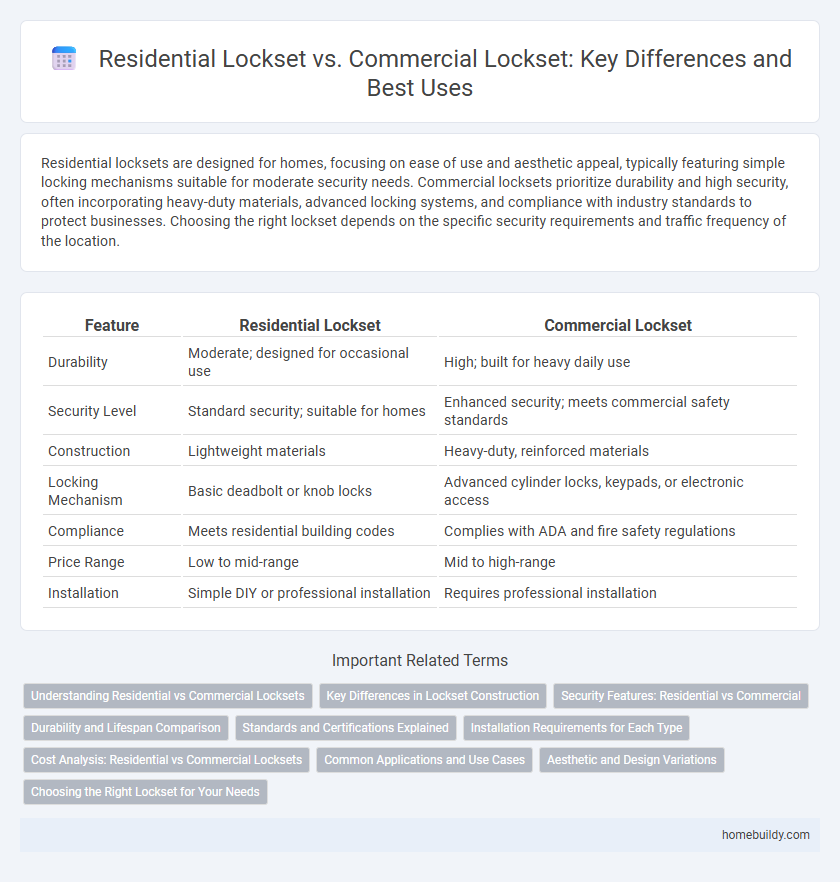Residential locksets are designed for homes, focusing on ease of use and aesthetic appeal, typically featuring simple locking mechanisms suitable for moderate security needs. Commercial locksets prioritize durability and high security, often incorporating heavy-duty materials, advanced locking systems, and compliance with industry standards to protect businesses. Choosing the right lockset depends on the specific security requirements and traffic frequency of the location.
Table of Comparison
| Feature | Residential Lockset | Commercial Lockset |
|---|---|---|
| Durability | Moderate; designed for occasional use | High; built for heavy daily use |
| Security Level | Standard security; suitable for homes | Enhanced security; meets commercial safety standards |
| Construction | Lightweight materials | Heavy-duty, reinforced materials |
| Locking Mechanism | Basic deadbolt or knob locks | Advanced cylinder locks, keypads, or electronic access |
| Compliance | Meets residential building codes | Complies with ADA and fire safety regulations |
| Price Range | Low to mid-range | Mid to high-range |
| Installation | Simple DIY or professional installation | Requires professional installation |
Understanding Residential vs Commercial Locksets
Residential locksets typically feature simpler designs with a primary focus on convenience and basic security, often incorporating key-in-knob or deadbolt mechanisms suitable for homes. Commercial locksets are engineered for higher durability and security standards, including features such as heavy-duty latches, ANSI/BHMA certifications, and compatibility with master key systems to address the demands of business environments. Understanding the difference in construction, security ratings, and functionality helps in selecting the appropriate lockset tailored to either residential safety or commercial access control needs.
Key Differences in Lockset Construction
Residential locksets typically feature lighter materials such as zinc alloys or brass, prioritizing aesthetics and moderate security for home use. Commercial locksets are constructed from heavy-duty metals like stainless steel or hardened steel to withstand higher traffic and increased security demands. The internal mechanisms of commercial locksets often include reinforced deadbolts and advanced locking cylinders designed for durability and resistance to tampering.
Security Features: Residential vs Commercial
Residential locksets typically feature basic security elements such as standard keyways, simple deadbolts, and latch bolts designed for moderate protection against forced entry. Commercial locksets incorporate advanced security mechanisms including heavy-duty deadbolts, reinforced strike plates, drill-resistant cylinders, and key control systems to withstand higher levels of unauthorized access attempts. The robust construction and complex locking functions in commercial locksets provide enhanced durability, resistance to lock picking, and compliance with industry security standards.
Durability and Lifespan Comparison
Residential locksets typically feature lighter-duty materials and mechanisms designed for moderate use, resulting in a shorter lifespan of around 5 to 10 years. Commercial locksets are built with heavy-duty metals and reinforced components to withstand high-frequency use and harsh conditions, often lasting 10 to 25 years or more. The enhanced durability of commercial locksets makes them ideal for businesses requiring reliable, long-term security solutions.
Standards and Certifications Explained
Residential locksets typically comply with standards such as ANSI/BHMA Grade 2 or Grade 3, providing adequate security and durability for home use, whereas commercial locksets meet the more stringent ANSI/BHMA Grade 1 certification, designed for heavy-duty use and higher security requirements. Commercial locksets often incorporate UL fire-rating standards and comply with ADA accessibility guidelines to ensure safety and accessibility in public or workplace environments. Understanding these certification differences is crucial for selecting the appropriate lockset to match security needs and regulatory compliance.
Installation Requirements for Each Type
Residential locksets typically require simpler installation processes, often compatible with standard door preparations and powered by basic tools like screwdrivers. Commercial locksets demand more precise installation, usually involving reinforced door frames and compatibility with advanced hardware such as mortise locks or electronic access systems. Proper alignment with the door's structural specifications and adherence to industry standards are crucial for ensuring security and functionality in commercial settings.
Cost Analysis: Residential vs Commercial Locksets
Residential locksets typically cost between $20 and $100, reflecting simpler designs and lower durability requirements, while commercial locksets range from $100 to $500 due to enhanced security features and heavy-duty construction. The higher upfront investment in commercial locksets often results in long-term savings by reducing maintenance and replacement frequency in high-traffic environments. Budget considerations must weigh initial costs against security needs and usage patterns to determine the most cost-effective lockset solution.
Common Applications and Use Cases
Residential locksets are commonly used in homes, apartments, and small residential buildings, providing security for entry doors, interior doors, and bedrooms. Commercial locksets are designed for high-traffic areas such as offices, retail stores, and industrial facilities, offering enhanced durability and security features like key control and access management. Residential locksets typically focus on ease of use and aesthetic appeal, while commercial locksets prioritize compliance with building codes and high resistance to forced entry.
Aesthetic and Design Variations
Residential locksets often feature decorative designs with polished finishes such as brass, bronze, or satin nickel to complement home interiors and enhance curb appeal. Commercial locksets prioritize functionality and durability, typically showcasing utilitarian styles with robust metal finishes like stainless steel or anodized aluminum to withstand heavy use and maintain security. Design variations also include ergonomic lever handles common in commercial settings for accessibility, while residential locksets frequently use traditional knob styles for aesthetic versatility.
Choosing the Right Lockset for Your Needs
Residential locksets prioritize ease of use and aesthetic appeal, featuring simpler mechanisms suitable for home security, while commercial locksets emphasize durability, higher security ratings, and compliance with industry standards like ANSI/BHMA Grade 1. Selecting the right lockset depends on factors such as traffic volume, security requirements, and skill level of users; residential settings often benefit from key-in-knob or deadbolt locks, whereas commercial properties require heavy-duty cylindrical locks or mortise locks. Considerations include material strength, key control systems, and integration with access control technology to ensure optimal protection aligned with the environment's demands.
Residential Lockset vs Commercial Lockset Infographic

 homebuildy.com
homebuildy.com